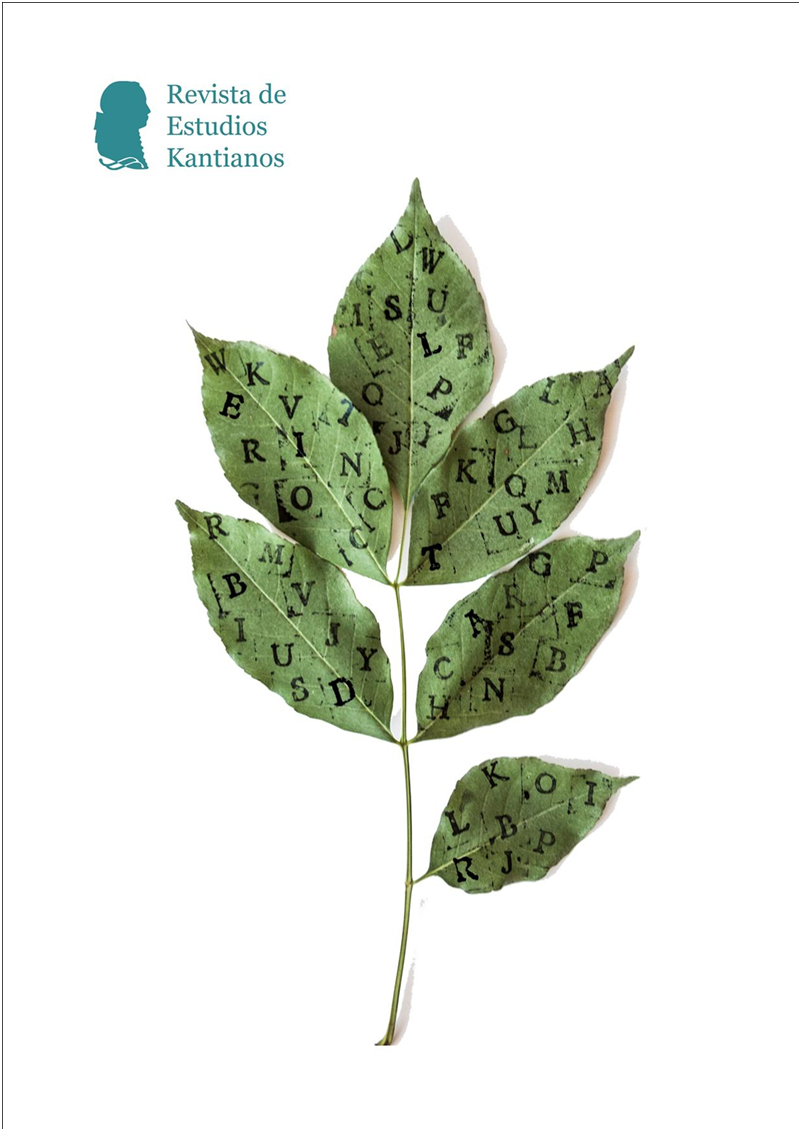El origen discursivo del concepto y su necesaria modalización en la filosofía kantiana
DOI:
https://doi.org/10.7203/REK.9.1.28346Keywords:
Modalidad, conceptos, lógica, discursividad, posibilidad Abstract
Abstract
En la Crítica de la Razón Pura, Kant define los juicios modales como un tipo especial de enlace, que pone en relación a los conceptos con las propias facultades cognoscitivas. Las categorías modales no expanden en lo más mínimo el contenido de un conocimiento, sino que son las formas en las que se pueden pensar los conceptos como conocimiento, esto es, en relación con algo como posible, efectivo o necesario. Esta peculiaridad de la teoría lógica kantiana está siendo estudiada de forma renovada en los últimos años, principalmente por la corriente analítica. Nuestro interés dentro de este tema es la relación entre la modalidad, el pensamiento discursivo y los conceptos; y cómo el concepto, por su propia naturaleza discursiva, está siempre acompañado de la conciencia de su posibilidad.
 Downloads
Downloads
 References
References
Allison, H. (1983). Kant’s Transcendental Idealism. An Interpretation and Defense. Yale University Press.
Abaci, U. (2008). Kant’s Theses on Existence. British Journal of History of Philosophy, 16(3), 559–593.
Abaci, U. (2019). Kant’s Revolutionary Theory of Modality. Oxford University Press.
Blecher, I. (2013). Kant on Formal Modality. Kant-Studien, 104(1), 44–62.
Caimi, M. (2016). La función regulativa del ideal de la razón pura. Revista de filosofía DIÁNOIA, 42(42), 61–79.
Chignell, A. (2014). Kant and the ‘Monstrous’ Ground of Possibility. Kantian Review, 19(1), 53–69.
Frege, G. (1973). Fundamentos de aritmética. Editorial Laia.
Frege, G. (2017). Escritos lógico-filosóficos. Colihue.
Forgie, W. (2000). Kant and Frege: Existence as a Second-Level Property. Kant-Studien, 91, 165–177.
Forgie, W. (2008a). How Is the Question ‘Is Existence a Predicate?’ Relevant to the Ontological Argument? International Journal for Philosophy of Religion, 64(3), 117–133.
Forgie, W. (2008b). Kant and Existence: Critique of Pure Reason A 600/B 628. Kant-Studien, 99(1), 1–12.
Hanna, R. (2001). Kant and the Foundations of Analytic Philosophy. Clarendon Press.
Kannisto, T. (2017). Kant and Frege on Existence. Synthese, 195(8), 3407–3432.
Kant, I. (1902–ss). Gesammelte Schriften. 23 vol. Königlich-Preussischen Akademie der Wissenschaften zu Berlin.
Kant, I. (2000). Lógica. Un manual de lecciones. Akal.
Kant, I. (2008). Los progresos de la metafísica. FCE.
Kant, I. (2016). Crítica del discernimiento. Antonio Machado Libros.
Kant, I. (2022). Crítica de la razón pura. Colihue.
Kemp Smith, N. (1918). A commentary to Kant’s ‘Critique of pure reason’. Macmillan and Co.
Leech, J. (2014). Making Modal Distinctions: Kant on the Possible, the Actual, and the Intuitive Understanding. Kantian Review, 19(3), 339–365.
Longuenesse, B. (1998). Kant and the Capacity to Judge. Princeton University Press.
Longuenesse, B. (2005). The transcendental ideal, and the unity of the critical system. En Kant on the Human Standpoint (páginas211-235). Cambridge University Press.
Palermo, S. (2018). Más allá de los límites del pensar discursivo. Notas sobre la figura del entendimiento intuitivo en la Crítica de la Facultad de Juzgar. Verifiche, 47(1–2), 5–37.
Pelegrin, L. (2022). Sobre una referencia implícita a la distinción entre intellectus archetypus e intellectus ectypus en el parágrafo 14 de la Crítica de la razón pura. Revista de Estudios Kantianos, 7(2), 342–359.
Winegar, R. (2017). Kant on God’s Intuitive Understanding: Interpreting CJ §76’s Modal Claims. Kantian Review, 22(2), 305–329.
Downloads
Published
How to Cite
-
Abstract165
-
PDF (Español)61
Issue
Section
License
![]()
The authors who publish in this journal agree with the following terms:
- The authors retain their copyright and guarantee to the journal the right to be the first to publish the work and to license it under a Creative Commons Attribution License that allows others to share the work with an acknowledgement of its authorship and the initial publication in this journal.
- Authors may separately establish additional agreements for non-exclusive distribution of the version of the work published in the journal (for example, placing it in an institutional repository or publishing it in a book), with acknowledgement of its initial publication in this journal.
- Authors are allowed and encouraged to disseminate their work electronically (e.g., in institutional repositories or on their own website) before and during the submission process, as this can lead to productive exchanges as well as earlier and greater citation of published work (see The Effect of Open Access).








